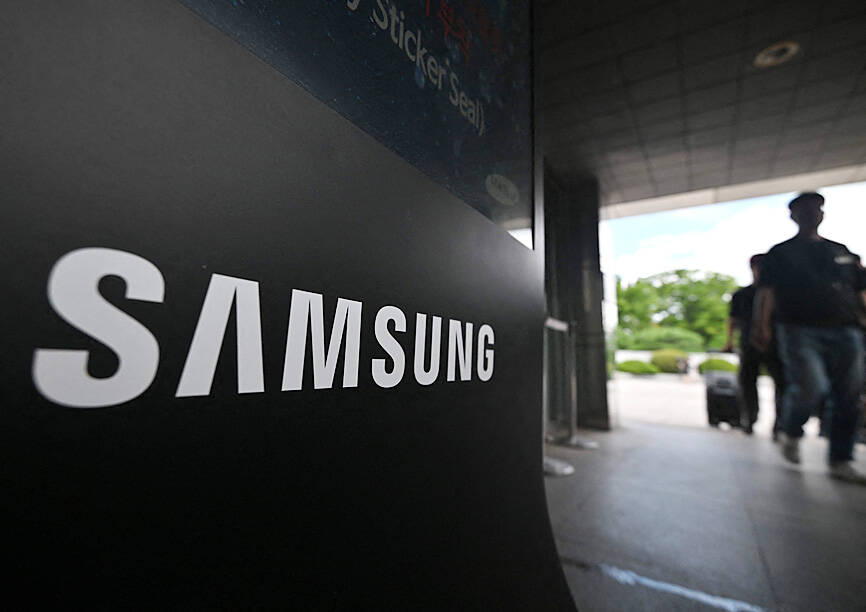Samsung Electronics Co must adopt a “do-or-die” mindset to confront the challenges posed by artificial intelligence (AI) that are upending the industry, Yonhap news cited chairman Jay Y. Lee as saying yesterday.
Samsung has been struggling to meet Nvidia Corp’s requirements, as rival SK Hynix Inc has become the titan’s main supplier of high-bandwidth memory (HBM) chips for its AI graphics processing units.
The world’s largest memorychip maker in October last year acknowledged that it was facing a “crisis” and admitted questions had arisen about its “fundamental technological competitiveness and the future of the company.”

Photo: Jung Yeon-je, AFP
“Samsung is facing a do-or-die survival issue. We need to reflect deeply from the top,” Lee was quoted as saying during a training for top executives.
Lee’s message was to emphasize that “what matters is not the crisis itself, but the attitude in dealing with it,” Yonhap reported, citing company sources.
Lee also said that “even if it means sacrificing short-term profits, we must invest for the future,” Yonhap added.
A Samsung spokesperson yesterday said that Lee had not “said the message himself” without giving further details.
Separately, South Korean semiconductor exports to China plunged last month, deepening concerns about a cooling in global demand already threatened by US tariffs, as Washington steps up its restrictions on technology supplies to Beijing.
Chip sales to the world’s second-largest economy, including Hong Kong, fell 31.8 percent from a year earlier, the South Korean Ministry of Trade, Industry and Energy said on Sunday. That is bigger than the 22.5 percent contraction reported for January and comes after a rally last year that helped fuel South Korea’s economic growth.
The decline at the beginning of this year coincides with the US implementing its export restrictions on cutting-edge semiconductors to China. The US Department of Commerce in December last year slapped fresh curbs on the sale of HBM chips to China.
South Korea’s total semiconductor exports slipped 3 percent from a year earlier last month, ministry data showed.
Declining prices in conventional memory chips and a technological transition in semiconductor production were among reasons the growth in exports slowed, the ministry said.
Additional reporting by Bloomberg

NEW IDENTITY: Known for its software, India has expanded into hardware, with its semiconductor industry growing from US$38bn in 2023 to US$45bn to US$50bn India on Saturday inaugurated its first semiconductor assembly and test facility, a milestone in the government’s push to reduce dependence on foreign chipmakers and stake a claim in a sector dominated by China. Indian Prime Minister Narendra Modi opened US firm Micron Technology Inc’s semiconductor assembly, test and packaging unit in his home state of Gujarat, hailing the “dawn of a new era” for India’s technology ambitions. “When young Indians look back in the future, they will see this decade as the turning point in our tech future,” Modi told the event, which was broadcast on his YouTube channel. The plant would convert

‘SEISMIC SHIFT’: The researcher forecast there would be about 1.1 billion mobile shipments this year, down from 1.26 billion the prior year and erasing years of gains The global smartphone market is expected to contract 12.9 percent this year due to the unprecedented memorychip shortage, marking “a crisis like no other,” researcher International Data Corp (IDC) said. The new forecast, a dramatic revision down from earlier estimates, gives the latest accounting of the ongoing memory crunch that is affecting every corner of the electronics industry. The demand for advanced memory to power artificial intelligence (AI) tasks has drained global supply until well into next year and jeopardizes the business model of many smartphone makers. IDC forecast about 1.1 billion mobile shipments this year, down from 1.26 billion the prior

People stand in a Pokemon store in Tokyo on Thursday. One of the world highest-grossing franchises is celebrated its 30th anniversary yesterday.

Zimbabwe’s ban on raw lithium exports is forcing Chinese miners to rethink their strategy, speeding up plans to process the metal locally instead of shipping it to China’s vast rechargeable battery industry. The country is Africa’s largest lithium producer and has one of the world’s largest reserves, according to the US Geological Survey (USGS). Zimbabwe already banned the export of lithium ore in 2022 and last year announced it would halt exports of lithium concentrates from January next year. However, on Wednesday it imposed the ban with immediate effect, leaving unclear what the lithium mining sector would do in the